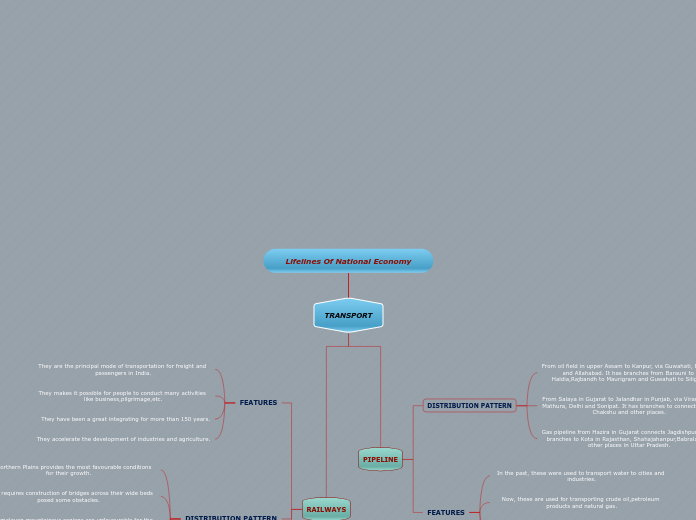Lifelines Of National Economy
TRANSPORT
RAILWAYS
FEATURES
They are the principal mode of transportation for freight and passengers in India.
They makes it possible for people to conduct many activities like business,pilgrimage,etc.
They have been a great integrating for more than 150 years.
They accelerate the development of industries and agriculture.
DISTRIBUTION PATTERN
The Northern Plains provides the most favourable conditions for their growth.
Rivers requires construction of bridges across their wide beds posed some obstacles.
The Himalayan mountainous regions are unfavourable for the construction of railways.
In Hilly terrains of the peninsular region, railway tracts are laid through low hills, gaps or tunnels.
PROBLEMS
They have faced sinking of tracks in some stretches and landslides.
Many passengers travel without tickets.
Thefts and damaging of railway property has not yet stopped completely.
PIPELINE
DISTRIBUTION PATTERN
From oil field in upper Assam to Kanpur, via Guwahati, Barauni and Allahabad. It has branches from Barauni to Haldia,Rajbandh to Maurigram and Guwahati to Siliguri.
From Salaya in Gujarat to Jalandhar in Punjab, via Viramgam, Mathura, Delhi and Sonipat. It has branches to connect Koyali Chakshu and other places.
Gas pipeline from Hazira in Gujarat connects Jagdishpur. It has branches to Kota in Rajasthan, Shahajahanpur,Babrala and other places in Uttar Pradesh.
FEATURES
In the past, these were used to transport water to cities and industries.
Now, these are used for transporting crude oil,petroleum products and natural gas.
Initial cost of laying pipelines is high but subsequent running costs are minimal.
It rules out trans-shipment losses or delays.
